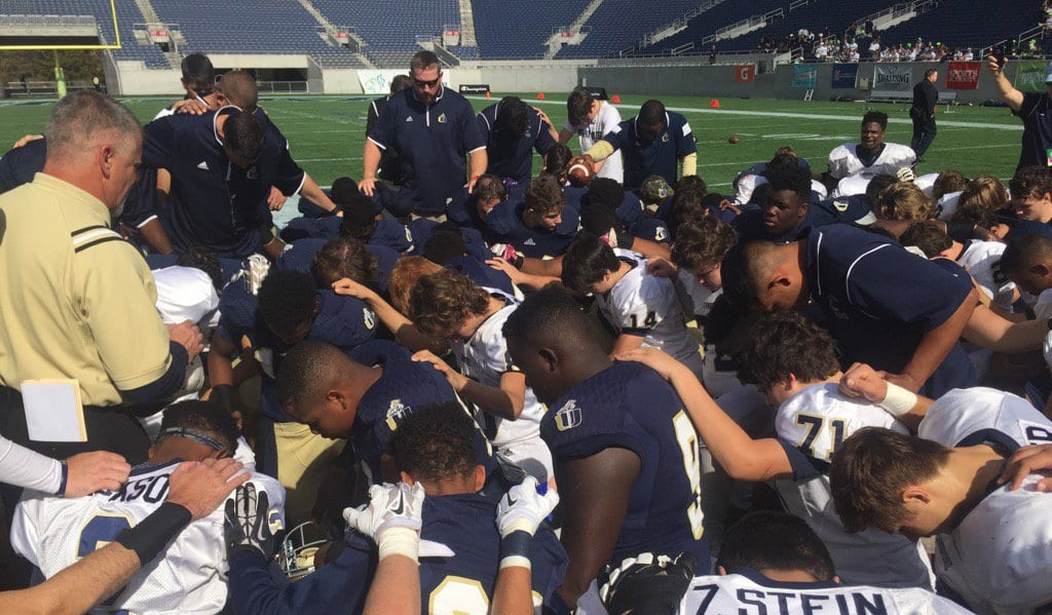Last week, the Florida High School Athletic Association (FHSAA) told the football teams at two Christian schools they could not use the PA system for a pre-game prayer at a state championship game. One schoolmaster attacked this as a “double standard.” Nevertheless, the teams meekly led the audience in The Lord’s Prayer from midfield, without a loudspeaker.
“We’ve played 13 football games this year. We’ve prayed before every one of them,” Tim Euler, head of Cambridge Christian School in Tampa, told baynews9.com. “We do this every game, we pray over the loudspeaker — the Pledge of Allegiance over the loudspeaker — I don’t understand it,” football fan Mark McConnell told wesh.com.
A “Double Standard?”
In a phone interview with PJ Media, Euler called the PA system prayer ban a “double standard.” The head of school referred to an email from FHSAA Executive Director Roger Dearing, which listed two reasons for the denial of prayer over the loudspeaker.
“First, the fact that the facility is a public facility, predominantly paid for with public tax dollars, makes the facility ‘off limits’ under federal guidelines and precedent court cases,” Dearing explained.
“Second, is the fact that in Florida Statutes, the FHSAA (host and coordinator of the event) is legally a ‘State Actor’ — we cannot legally permit or grant permission for such an activity.”
Dearing assured Euler that “I totally understand the desire, and why your request is made,” but he regretfully had to decline. “For me to grant the wish could subject this Association to tremendous legal entanglements,” he said.
These two reasons may be perfectly rational, but they do not keep the Florida state legislature from praying before its sessions, Euler argued. “The issue that they raised is they’re a state actor — they’re acting on behalf of the state, and therefore they couldn’t allow it. The state legislature obviously acts on behalf of the state, but it opens with prayer.” He mentioned that the Florida Capitol building is also a public facility.
“It’s a double standard,” Euler declared. “If they can do it there and we can’t do it where we want to do it, and that’s the reasoning, then it’s a double standard.”
Euler would not speculate on the motivation behind the PA prayer ban, and he said it likely has nothing to do with the “prayer shaming” following the tragic San Bernardino shooting in California. Nevertheless, he gladly shared his email correspondence with PJ Media. “Our desires are to raise awareness of the situation,” he explained.
“I think that asking for prayer from two Christian schools is not too much to ask for, when both schools consented,” Euler added. “I don’t think there’s any extenuating circumstances that should have caused the denying of the request.”
“It seems, in our country, it’s ok to pray during times of need but not ok during times of thanksgiving,” Euler concluded. “I think we’re called to pray at all times.”
A Supreme Court Decision
FHSAA also responded to PJ Media’s request for comment, and gave a solid defense of their decision.
FHSAA spokesman Corey Sobers explained in an email statement that prayer over the PA system is “not an issue if they do it on their own campus as a Christian school.” Since “the vast majority of Class 2A (football teams) are Christian schools it is unlikely there would be an issue.” This game, however, was a state championship game held at the Citrus Bowl — a public stadium — and therefore subject to different regulations.
“The FHSAA, as host and coordinator of the event, is statutorily a ‘State Actor,’ and according to state and federal law, cannot legally permit or grant permission for the requested activity,” Sobers explained.
Sobers pointed to a 2000 U.S. Supreme Court decision — Santa Fe Independent School District v. Doe — to highlight the difficult legal position of allowing a loudspeaker prayer at this particular game.
“In 2000, the U.S. Supreme Court informed a Texas high school that it cannot allow its football team members to lead a prayer on the field before the start of the game, where the school allowed the team to use the stadium’s PA system to broadcast the prayer to the spectators,” Sobers explained. “While no school employee was involved in the actual prayer, the Court said the school gave the impression that it was endorsing the prayer by allowing the use of its PA system and tolerating the prayer as part of pre-game ceremonies.”
“Due to the fact that the two situations are related, the FHSAA is obligated to uphold and obey the U.S. Supreme Court decision,” Sobers concluded.
Nevertheless, Sobers emphasized that the FHSAA has “always accommodated pre-and post-game on-field prayer opportunities.” While the Citrus Bowl PA system is off-limits for these prayers, the FHSAA “has never prohibited teams from praying on the field or court, before or after a competition.”
“In this case, both teams conducted prayers before and after the championship game,” Sobers said.
Sobers did not respond to Euler’s allegation that it is a “double standard” to allow the state legislature to pray while denying that freedom to schools. Since the FHSAA does not have any jurisdiction over the state legislature, however, it could be argued that they need not respond to such an allegation.
Following controversies over Starbucks Christmas cups and President Obama leaving Christ out of Christmas on the “A Charlie Brown Christmas,” this case has garnered quite a bit of attention. Despite the hullabaloo, prayer won out in the end — even without the loudspeaker.









Join the conversation as a VIP Member